丹尼尔笛福英文简介
- 格式:doc
- 大小:22.33 KB
- 文档页数:9
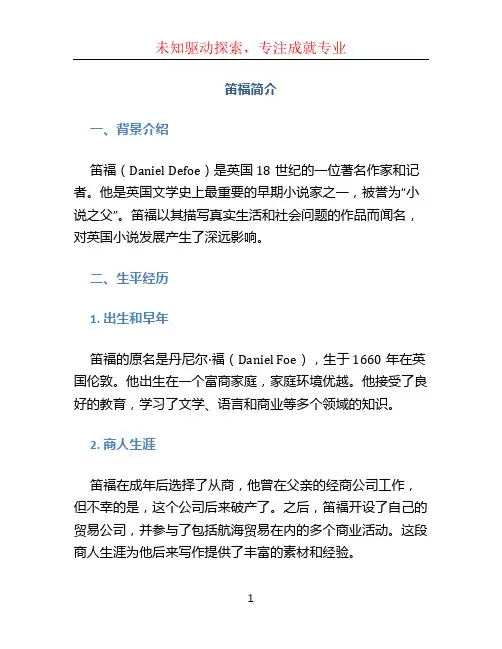
笛福简介一、背景介绍笛福(Daniel Defoe)是英国18世纪的一位著名作家和记者。
他是英国文学史上最重要的早期小说家之一,被誉为“小说之父”。
笛福以其描写真实生活和社会问题的作品而闻名,对英国小说发展产生了深远影响。
二、生平经历1. 出生和早年笛福的原名是丹尼尔·福(Daniel Foe),生于1660年在英国伦敦。
他出生在一个富商家庭,家庭环境优越。
他接受了良好的教育,学习了文学、语言和商业等多个领域的知识。
2. 商人生涯笛福在成年后选择了从商,他曾在父亲的经商公司工作,但不幸的是,这个公司后来破产了。
之后,笛福开设了自己的贸易公司,并参与了包括航海贸易在内的多个商业活动。
这段商人生涯为他后来写作提供了丰富的素材和经验。
3. 政治参与除了商界,笛福还积极参与政治活动。
他是一名自由主义者,持有强烈的个人自由和言论自由观念。
他在伦敦市议会担任了几年的职务,并尝试为自由主义和民主价值观发声。
4. 文学事业尽管笛福参与了许多商业和政治活动,但他最著名的贡献还是在文学领域。
他的第一本著作是关于商业的书籍,但并没有获得太大的关注。
然而,他在1719年出版的《鲁滨逊漂流记》(Robinson Crusoe)将他推上了文学巅峰。
这本小说讲述了一个男人在荒岛上的生活经历,以及他如何适应并最终成功生活下来的故事。
这本小说至今仍被视为经典之作,影响了后来的许多作家。
此外,笛福还写过其他几部著名的小说,包括《大流行时期的日记》(A Journal of the Plague Year)和《罗克荒》(Moll Flanders)。
这些作品描绘了当时的社会和人性,具有很高的艺术价值和思想深度。
5. 逝世与遗产笛福于1731年去世,享年71岁。
他在文学领域的贡献被广泛认可,并对后世的文学发展产生了深远的影响。
他的作品被翻译成多种语言,并广泛传播至世界各地。
三、对文学的影响作为小说之父,笛福对英国小说的发展做出了重要贡献。


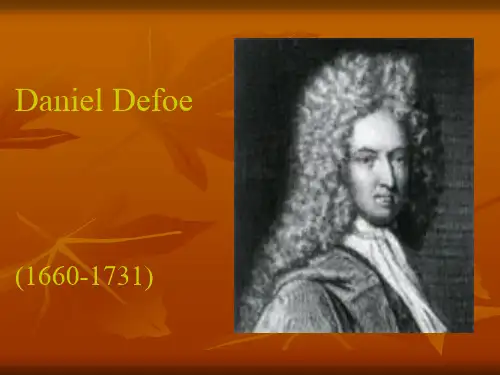
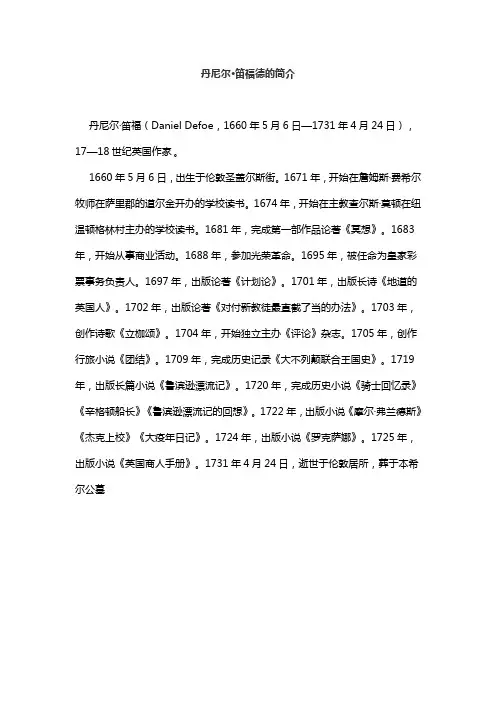
丹尼尔·笛福德的简介
丹尼尔·笛福(Daniel Defoe,1660年5月6日—1731年4月24日),17—18世纪英国作家。
1660年5月6日,出生于伦敦圣盖尔斯街。
1671年,开始在詹姆斯·费希尔牧师在萨里郡的道尔金开办的学校读书。
1674年,开始在主教查尔斯·莫顿在纽温顿格林村主办的学校读书。
1681年,完成第一部作品论著《冥想》。
1683年,开始从事商业活动。
1688年,参加光荣革命。
1695年,被任命为皇家彩票事务负责人。
1697年,出版论著《计划论》。
1701年,出版长诗《地道的英国人》。
1702年,出版论著《对付新教徒最直截了当的办法》。
1703年,创作诗歌《立枷颂》。
1704年,开始独立主办《评论》杂志。
1705年,创作行旅小说《团结》。
1709年,完成历史记录《大不列颠联合王国史》。
1719年,出版长篇小说《鲁滨逊漂流记》。
1720年,完成历史小说《骑士回忆录》《辛格顿船长》《鲁滨逊漂流记的回想》。
1722年,出版小说《摩尔·弗兰德斯》《杰克上校》《大疫年日记》。
1724年,出版小说《罗克萨娜》。
1725年,出版小说《英国商人手册》。
1731年4月24日,逝世于伦敦居所,葬于本希尔公墓。
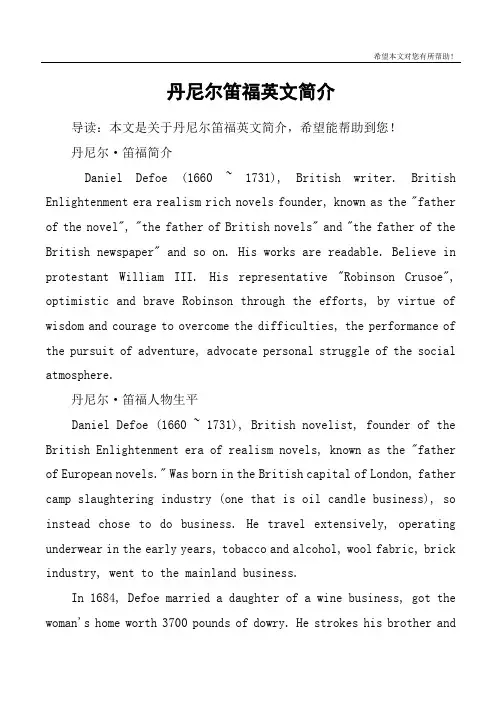
丹尼尔笛福英文简介导读:本文是关于丹尼尔笛福英文简介,希望能帮助到您!丹尼尔·笛福简介Daniel Defoe (1660 ~ 1731), British writer. British Enlightenment era realism rich novels founder, known as the "father of the novel", "the father of British novels" and "the father of the British newspaper" and so on. His works are readable. Believe in protestant William III. His representative "Robinson Crusoe", optimistic and brave Robinson through the efforts, by virtue of wisdom and courage to overcome the difficulties, the performance of the pursuit of adventure, advocate personal struggle of the social atmosphere.丹尼尔·笛福人物生平Daniel Defoe (1660 ~ 1731), British novelist, founder of the British Enlightenment era of realism novels, known as the "father of European novels." Was born in the British capital of London, father camp slaughtering industry (one that is oil candle business), so instead chose to do business. He travel extensively, operating underwear in the early years, tobacco and alcohol, wool fabric, brick industry, went to the mainland business.In 1684, Defoe married a daughter of a wine business, got the woman's home worth 3700 pounds of dowry. He strokes his brother andbrother and brother as a partner to start a small department store trading. In addition, it is still doing business in Europe, often making wine trade to increase revenue. However, he followed the puritan principle in the "drunken" business, against the sale of gin and the usual spirits.In 1685 Defoe attended the rebellion of the Duke of Monmouth against the Catholic kings.In 1688 the Dutch believe in protestant William led his army to land in England, inherited the British throne, Defoe participated in his army.In 1692 he was bankrupt, debt amounted to 17,000 pounds, and later failed, and thus had to use a variety of ways to make a living. He has acted as a secret intelligence officer of the government, designed various development undertakings, and engaged in writing.In 1698 he published "on the development", to promote highway construction, bank, bankruptcy law, set up crazy homes, do water and fire insurance, levy income tax, school and so on.In 1701 he published a satirical poem "real British", that there is no purebred British, against the aristocratic Catholic forces, for the foreign faith in protestant William III defense. This song is printed with version 9.1702 issued a political theory "to eliminate the different sects of the shortcut", with irony, against the national religion oppression of different sects, clever writing, began to be seen isagainst Christians, after being found, by the fine and jail punishment, imprisonment 6 Month, flog three times, but by the people of London as a hero. In the prison he imitated the Greek poet pinarross's song to write a "lie" (1703), satirical law unfairly.In 1704, Daniel Defoe won the "Review" magazine for Whig's party leader Harry, which was supported by Harry's England-Scottish coalition policy. After 11 years he has been between England and Scotland, as Harry and his successor Toli pie Gordorfen secret intelligence officer, to collect public opinion. During this period, he wrote a short term imprisonment, but never terminated for the Whig party in power to collect intelligence, newspaper, write articles.Defoe began writing novels at the age of 59. In 1719 the first novel, "Robinson Crusoe" published, popular, he succeeded in shaping the image of an idealized bourgeois, in the history of European novels is a pioneering work. The same year and published a sequel.1720 and wrote "Robinson's pensive set." Since then, he has written several novels: "Captain Singleton" "Moore Flanders" "Colonel Jack" and so on. In addition, he also wrote a number of biographies, such as "deaf man Campbell", "peter Emperor Ji", several domestic and foreign travel, such as "New Global Travel" "Roberts Captain four travel" and so on. His novel to "Robinson Crusoe" spread the most widely, is considered his masterpiece.It is said that Flute has been associated with 26 magazines, some people call him "the father of modern news reports." His works,including a large number of political books, a total of 250 species, and both are the need to develop the development of the bourgeoisie, write the city middle class interested and concerned about the issue. (1722), written in 1665 London plague, the occurrence of the plague, the spread of the plague, the plague of the plague, the plague of the plague, It caused terror and panic, as well as the number of deaths, the situation of the escape was written as immersive. At that time the French Marseille plague epidemic, causing people's special attention, Defoe's work to meet the public's curiosity on plague.After the "Robinson Crusoe", he wrote some excellent works, including "Moore Flanders" and "Colonel Jack", which were classified as British literary classics."Robinson Crusoe" best-selling prompted him to write "Robinson Crusoe sequel", he let his hero made a global travel, Robinson's most journey is starting from Beijing, across Siberia to Russia Hangeersk. He has not been to China, but in the sequel talked about the time the European people do not know Heilongjiang.Defoe was too comfortable in his later years, and wrote a few books, some creditors have died, he sold a small brick factory with a small amount of money back to other people's debt, still not far from London to purchase A suite. However, he also has ups and downs, and creditors live in harmony, and could not expect a creditor's widow made a new lawsuit, the judicial machine again spin up, he was to avoid the property was confiscated, the housing and property transferto his son The His son is a capable journalist, who wants him or a villain. Defoe wrote: "I put myself in his subordinate position, trust him, entrusted him to other children who have no living security, and he has not even compassionate, tortured the children, tortured himself The unfortunate mother, who lived a very rich life.The flute of the seventies had to hide from the debt, and he had rented rooms in the center of London's old town.On the day of the 1731 day, the London Courier reported that the evening of the evening, the famous Daniel Defoe died in his own apartment in the Canakan Boulevard. The British love to write their own pretense, written cute, witty and brief. Defoe also wrote that he wanted to write on his tombstone: "Daniel Defoe". But they are another consideration, they wrote on his tombstone: "Daniel Defoe:" Robinson Crusoe "author.丹尼尔·笛福人物评价Defoe lives in the period of capitalist development, he belongs to the bourgeoisie, he is the middle class bourgeois spokesperson.Defoe life is most concerned about the development of capitalism, he strongly praised the bourgeoisie, he believes that the core issue of a country's development is the development of trade. "Give us trade is to give us everything", "trade is the world's prosperous life", which is his most fundamental proposition. Because he thought that trade made the manufacturing and maritime industry development, so that people have work, there are clothing to wear, have food,materials and therefore can maintain high prices, and can maintain a high rent, so the upper society also benefit. As long as there are hard-working people to develop trade, any place will flourish. All his economic works and some political works have played this proposition, put forward a number of specific recommendations. Defarge's idea of developing the economy is conducive to the development of the British society, but he enthusiastically supports the colonial system, proposes to seize and operate the colonies, propose ways to expand trade with backward countries, and embrace slaves. All this shows his class limitations.Defoe was so disgusted with the aristocrats who were proud of the door, and he tried to celebrate the bourgeoisie, not the upper class, and criticized the "gentleman" who looked down on "civilians". He said that the ancestor of the people is working. He stressed that businessmen are useful people, and gentlemen change businessmen, businessmen change the gentleman is a reasonable thing, and so on. praised his class, he in the "Rosanna" where there is a paragraph of the most obvious:Baron Robert and my view of the businessman is exactly the same. Baron Robert said - I think he is perfectly correct - an authentic businessman is the best gentleman in the country, both in knowledge, in the ritual or in judgment, the businessman is stronger than many nobles. Once they control the world, although there is no real estate, but also rich than the real estate of the gentleman.Defoe's attitude towards the working people is twofold. He believes that the root of the crime is poor, rich people are not guilty. Moore Flanders and Rohsana are embraced by the glorious path, because of poverty, so he is also sympathetic to the two characters. He advocated the development of industry and commerce to make the people work. But on the other hand, he was the workers working long time, low wages, underage children will work and other brutal exploitation of the phenomenon as a matter of course. This is the employer's point of view.Defoe accepted Locke's political thought, opposes despotism, and advocates civil rights. At that time the British parliament was the upper echelon of politicians fighting infighting places, bribing and all kinds of dirty means of public. Workers, peasants and the petty bourgeoisie are not represented at all. Defoe advocates that the basic right of man is that no one, including the king, the cabinet, and the congress, can not be violated. "The British are neither kings nor slaves of Congress." Defoe advocated freedom of religious belief, although the British did not like France, Spain, as in the religious issue of extreme autocracy, but the religion outside the protestant denominations and Catholic believers are also a variety of restrictions. He is a non-state religion protestant, who is a petty bourgeoisie who demands a political system that is in line with the "revolutionary principle" and demands freedom of belief. Defoe is the spokesman for this faction. He argues that the people should beeducated and advocated for women to be educated.In general, the thought of Defoe was progressive at the time, but the limitations of his thought were great. The bourgeoisie was still a progressive class and still struggled against feudal forces. Conservative aristocrats, landlords do not produce, sit huge rent income, the bourgeoisie organized large-scale industrial and commercial promotion of social development.The petty bourgeoisie, on the one hand, has the same place as the big bourgeoisie, and on the other, with the ruling class big bourgeoisie and aristocrats, and demand more liberal politics. Therefore, Defoe's views on the development of capitalism, against feudal forces, against political undemocratic, and against monopolies are all progressive. But he was subject to the constraints of the times and class prejudice and colonial system and racial discrimination, which is consistent with the big bourgeoisie, is reactionary. To the working people, he is only concerned with making them work and producing wealth, which coincides with the demands of capitalism. Defoe thought on this duality, clearly manifested in his literary works.Defoe is deeply understood by the characters he describes, and he is good at writing individuals to overcome difficulties in an unfavorable environment. His hero is intelligent, energetic, unbelief, believe in "common sense". plot, structure does not fall ax chisel trace. He is particularly good at describing theenvironment, the details of the fidelity, fictional scene written so that people as immersive.Defoe was so disgusted with the aristocrats who were proud of the door, and he tried to celebrate the bourgeoisie, not the upper class, and criticized the "gentleman" who looked down on "civilians". He said that the ancestor of the people is working. He stressed that businessmen are useful people, and gentlemen change businessmen, businessmen change the gentleman is a reasonable thing, and so on. praised his class, he in the "Rosanna" where there is a paragraph of the most obvious:Baron Robert and my view of the businessman is exactly the same. Baron Robert said - I think he is perfectly correct - an authentic businessman is the best gentleman in the country, both in knowledge, in the ritual or in judgment, the businessman is stronger than many nobles. Once they control the world, although there is no real estate, but also rich than the real estate of the gentleman.。
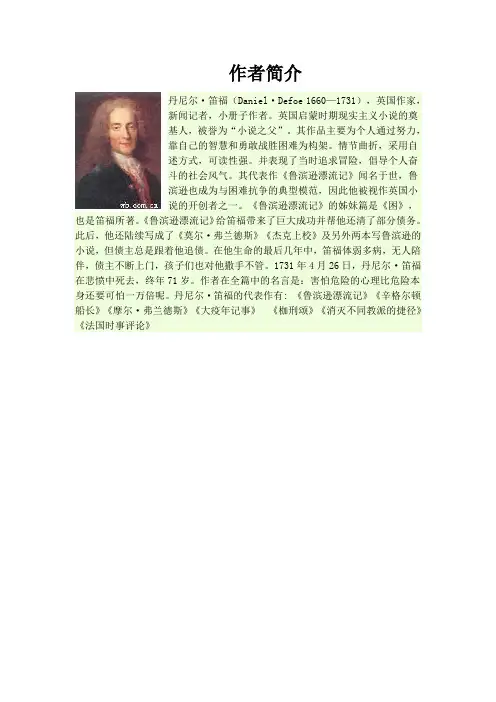
作者简介丹尼尔·笛福(Daniel·Defoe 1660—1731),英国作家,新闻记者,小册子作者。
英国启蒙时期现实主义小说的奠基人,被誉为“小说之父”。
其作品主要为个人通过努力,靠自己的智慧和勇敢战胜困难为构架。
情节曲折,采用自述方式,可读性强。
并表现了当时追求冒险,倡导个人奋斗的社会风气。
其代表作《鲁滨逊漂流记》闻名于世,鲁滨逊也成为与困难抗争的典型模范,因此他被视作英国小说的开创者之一。
《鲁滨逊漂流记》的姊妹篇是《困》,也是笛福所著。
《鲁滨逊漂流记》给笛福带来了巨大成功并帮他还清了部分债务。
此后,他还陆续写成了《莫尔·弗兰德斯》《杰克上校》及另外两本写鲁滨逊的小说,但债主总是跟着他追债。
在他生命的最后几年中,笛福体弱多病,无人陪伴,债主不断上门,孩子们也对他撒手不管。
1731年4月26日,丹尼尔·笛福在悲愤中死去,终年71岁。
作者在全篇中的名言是:害怕危险的心理比危险本身还要可怕一万倍呢。
丹尼尔·笛福的代表作有: 《鲁滨逊漂流记》《辛格尔顿船长》《摩尔·弗兰德斯》《大疫年记事》《枷刑颂》《消灭不同教派的捷径》《法国时事评论》作品介绍《鲁滨逊漂流记》(Robinson Crusoe)旧译《鲁滨孙漂流记》,是由丹尼尔·笛福59岁时所著的第一部小说,首次出版于1719年4月25日。
这本小说被认为是第一本用英文以日记形式写成的小说,享有英国第一部现实主义长篇小说的头衔,是一部家喻户晓的现实主义回忆录式冒险小说,是18世纪英国著名作家笛福受一个苏格兰水手海上遇险的经历启发用英文以日记形式写成的小说。
笛福在书中塑造了一个勇于面对自然挑战的新型人物——鲁滨逊·克鲁索。
他不屑守成,倾心开拓,三番五次的抛开小康家庭,出海闯天下。
在遭遇海难流落到荒岛上以后,他运用自己的头脑和双手,修建住所,种植粮食,驯养家畜,制造器具,缝纫衣服,把荒岛改造成“世外桃源"。
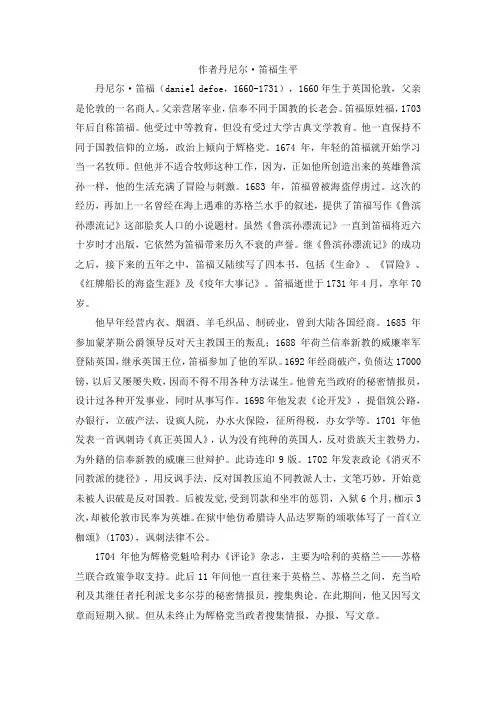
作者丹尼尔·笛福生平丹尼尔·笛福(daniel defoe,1660-1731),1660年生于英国伦敦,父亲是伦敦的一名商人。
父亲营屠宰业,信奉不同于国教的长老会。
笛福原姓福,1703年后自称笛福。
他受过中等教育,但没有受过大学古典文学教育。
他一直保持不同于国教信仰的立场,政治上倾向于辉格党。
1674年,年轻的笛福就开始学习当一名牧师。
但他并不适合牧师这种工作,因为,正如他所创造出来的英雄鲁滨孙一样,他的生活充满了冒险与刺激。
1683年,笛福曾被海盗俘虏过。
这次的经历,再加上一名曾经在海上遇难的苏格兰水手的叙述,提供了笛福写作《鲁滨孙漂流记》这部脍炙人口的小说题材。
虽然《鲁滨孙漂流记》一直到笛福将近六十岁时才出版,它依然为笛福带来历久不衰的声誉。
继《鲁滨孙漂流记》的成功之后,接下来的五年之中,笛福又陆续写了四本书,包括《生命》、《冒险》、《红牌船长的海盗生涯》及《疫年大事记》。
笛福逝世于1731年4月,享年70岁。
他早年经营内衣、烟酒、羊毛织品、制砖业,曾到大陆各国经商。
1685年参加蒙茅斯公爵领导反对天主教国王的叛乱;1688年荷兰信奉新教的威廉率军登陆英国,继承英国王位,笛福参加了他的军队。
1692年经商破产,负债达17000镑,以后又屡屡失败,因而不得不用各种方法谋生。
他曾充当政府的秘密情报员,设计过各种开发事业,同时从事写作。
1698年他发表《论开发》,提倡筑公路,办银行,立破产法,设疯人院,办水火保险,征所得税,办女学等。
1701年他发表一首讽刺诗《真正英国人》,认为没有纯种的英国人,反对贵族天主教势力,为外籍的信奉新教的威廉三世辩护。
此诗连印9版。
1702年发表政论《消灭不同教派的捷径》,用反讽手法,反对国教压迫不同教派人士,文笔巧妙,开始竟未被人识破是反对国教。
后被发觉,受到罚款和坐牢的惩罚,入狱6个月,枷示3次,却被伦敦市民奉为英雄。
在狱中他仿希腊诗人品达罗斯的颂歌体写了一首《立枷颂》(1703),讽刺法律不公。
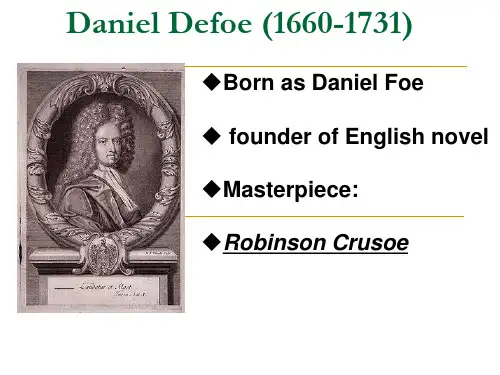
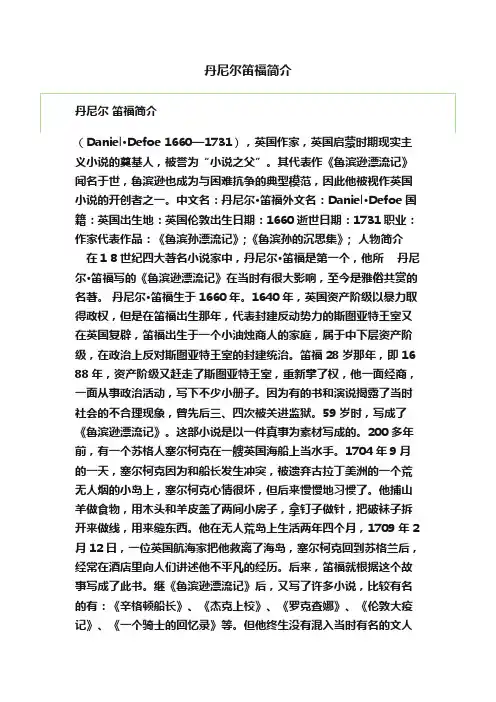
丹尼尔笛福简介义小说的奠基人,被誉为“小说之父”。
其代表作《鲁滨逊漂流记》闻名于世,鲁滨逊也成为与困难抗争的典型模范,因此他被视作英国小说的开创者之一。
中文名:丹尼尔·笛福外文名:Daniel·Defoe国籍:英国出生地:英国伦敦出生日期:1660逝世日期:1731职业:作家代表作品:《鲁滨孙漂流记》;《鲁滨孙的沉思集》; 人物简介在18世纪四大著名小说家中,丹尼尔·笛福是第一个,他所丹尼尔·笛福写的《鲁滨逊漂流记》在当时有很大影响,至今是雅俗共赏的名著。
丹尼尔·笛福生于1660年。
1640年,英国资产阶级以暴力取得政权,但是在笛福出生那年,代表封建反动势力的斯图亚特王室又在英国复辟,笛福出生于一个小油烛商人的家庭,属于中下层资产阶级,在政治上反对斯图亚特王室的封建统治。
笛福28岁那年,即16 88年,资产阶级又赶走了斯图亚特王室,重新掌了权,他一面经商,一面从事政治活动,写下不少小册子。
因为有的书和演说揭露了当时社会的不合理现象,曾先后三、四次被关进监狱。
59岁时,写成了《鲁滨逊漂流记》。
这部小说是以一件真事为素材写成的。
200多年前,有一个苏格人塞尔柯克在一艘英国海船上当水手。
1704年9月的一天,塞尔柯克因为和船长发生冲突,被遗弃古拉丁美洲的一个荒无人烟的小岛上,塞尔柯克心情很坏,但后来慢慢地习惯了。
他捕山羊做食物,用木头和羊皮盖了两间小房子,拿钉子做针,把破袜子拆开来做线,用来缝东西。
他在无人荒岛上生活两年四个月,1709年2月12日,一位英国航海家把他救离了海岛,塞尔柯克回到苏格兰后,经常在酒店里向人们讲述他不平凡的经历。
后来,笛福就根据这个故事写成了此书。
继《鲁滨逊漂流记》后,又写了许多小说,比较有名的有:《辛格顿船长》、《杰克上校》、《罗克查娜》、《伦敦大疫记》、《一个骑士的回忆录》等。
但他终生没有混入当时有名的文人圈子里。
这些文人出身的社会地位比他高。

作者简介:Daniel Defoe (1660-1731) English novelist, pamphleteer, and journalist, is most famous as the author of Robinson Crusoe (1719), a story of a man shipwrecked alone on an island. Along with Samuel Richardson, Defoe is considered the founder of the English novel.Defoe was born as the son of James Foe, a butcher of Stroke Newington. He studied at Charles Morton's Academy, London. Although his Nonconformist father intended him for the ministry, Defoe plunged into politics and trade, traveling extensively in Europe. In the early 1680s Defoe was a commission merchant in Cornhill but went bankrupt in 1691. In 1684 he married Mary Truffle; they had two sons and five daughters.Defoe earned fame and royal favor with his satirical poem "The True born Englishman" (1701). In 1702 Defoe wrote his famous pamphlet The Shortest Way With Dissenters. Himself a Dissenter he mimicked the extreme attitudes of High Anglican Tories and pretended to argue for the extermination of all Dissenters. Nobody was amused; Defoe was arrested and pilloried in May 1703. While in prison Defoe wrote a mock ode, "Hymn To The Pillory" (1703). The poem was sold in the streets, the audience drank to his health while he stood in the pillory and read aloud his verses.When the Tories fell from power Defoe continued to carry out intelligence work for the Whig government. In his own days Defoe was regarded as an unscrupulous, diabolical journalist.Defoe was one of the first to write stories about believable characters in realistic situations using simple prose. He achieved literary immortality when in April 1719 he published Robinson Crusoe, which was based partly on the memoirs of voyagers and castaways, such as Alexander Selkirk. During the remaining years, Defoe concentrated on books rather than pamphlets. Among his works are MollFlanders(1722), A Journal Of The Plague Year (1722) and Captain Jack(1722) Hislast great work of fiction, Roxana, appeared in 1724. In the 1720s Defoe had ceased to be politically controversial in his writings, and he produced several historical works, a guide book and The Great Law Of Subordination Considered (1724), an examination of the treatment of servants.Phenomenally industrious, Defoe produced in his last years also works involving the supernatural, The Political History of The Evil (1726) and An Essay On The History And Reality of apparitions (1727). He died on 26 April 1731, at his lodgings in Ropewalker’s Alley, Moorefield’s.重要作品简介:Robinson CrusoeRobinson Crusoe is an Englishman from the town of York in the seventeenth century, the youngest son of a merchant of German origin. Encouraged by his father to study law, Crusoe expresses his wish to go to sea instead. His family is against Crusoe going out to sea, and his father explains that it is better to seek a modest, secure life for oneself. Initially, Robinson is committed to obeying his father, but he eventually succumbs to temptation and embarks on a ship bound for London with a friend. When a storm causes the near deaths of Crusoe and his friend, the friend is dissuaded from sea travel, but Crusoe still goes on to set himself up as merchant on a ship leaving London. This trip is financially successful, and Crusoe plans another, leaving his early profits in the care of a friendly widow. The second voyage does not prove as fortunate: the ship is seized by Moorish pirates, and Crusoe is enslaved to a potentate in the North African town of Sallee. While on a fishing expedition, he and a slave boy break free and sail down the African coast. A kindly Portuguese captain picks them up, buys the slave boy from Crusoe, and takes Crusoe to Brazil. In Brazil, Crusoe establishes himself as a plantation owner and soon becomes successful. Eager for slave labor and its economic advantages, he embarks on a slave-gathering expedition to West Africa but ends up shipwrecked off of the coast of Trinidad.Crusoe soon learns he is the sole survivor of the expedition and seeks shelter and food for himself. He returns to the wreck’s remains twelve times to salvage guns, powder, food, and other items. Onshore, he finds goats he can graze for meat and buildshimself a shelter. He erects a cross that he inscribes with the date of his arrival, September 1, 1659, and makes a notch every day in order never to lose track of time. He also keeps a journal of his household activities, noting his attempts to make candles, his lucky discovery of sprouting grain, and his construction of a cellar, among other events. In June 1660, he falls ill and hallucinates that an angel visits, warning him to repent. Drinking tobacco-steeped rum, Crusoe experiences a religious illumination and realizes that God has delivered him from his earlier sins. After recovering, Crusoe makes a survey of the area and discovers he is on an island. He finds a pleasant valley abounding in grapes, where he builds a shady retreat. Crusoe begins to feel more optimistic about being on the island, describing himself as its “king.” He trains a pet parrot, takes a goat as a pet, and develops skills in basket weaving, bread making, and pottery. He cuts down an enormous cedar tree and builds a huge canoe from its trunk, but he discovers that he cannot move it to the sea. After building a smaller boat, he rows around the island but nearly perishes when swept away by a powerful current. Reaching shore, he hears his parrot calling his name and is thankful for being saved once again. He spends several years in peace.One day Crusoe is shocked to discover a man’s footprint on the beach. He first assumes the footprint is the devil’s, then decide s it must belong to one of the cannibals said to live in the region. Terrified, he arms himself and remains on the lookout for cannibals. He also builds an underground cellar in which to herd his goats at night and devises a way to cook underground. One evening he hears gunshots, and the next day he is able to see a ship wrecked on his coast. It is empty when he arrives on the scene to investigate. Crusoe once again thanks Providence for having been saved. Soon afterward, Crusoe discovers that the shore has been strewn with human carnage, apparently the remains of a cannibal feast. He is alarmed and continues to be vigilant. Later Crusoe catches sight of thirty cannibals heading for shore with their victims. One of the victims is killed. Another one, waiting to be slaughtered, suddenly breaks free and runs toward Crusoe’s dwelling. Crusoe protects him, killing one of the pursuers and injuring the other, whom the victim finally kills. Well-armed, Crusoe defeats most of the cannibals onshore. The victim vows total submission to Crusoe in gratitude for his liberation. Crusoe names him Friday, to commemorate the day onwhich his life was saved, and takes him as his servant.Finding Friday cheerful and intelligent, Crusoe teaches him some English words and some elementary Christian concepts. Friday, in turn, explains that the cannibals are divided into distinct nations and that they only eat their enemies. Friday also informs Crusoe that the cannibals saved the men from the shipwreck Crusoe witnessed earlier, and that those men, Spaniards, are living nearby. Friday expresses a longing to return to his people, and Crusoe is upset at the prospect of losing Friday. Crusoe then entertains the idea of making contact with the Spaniards, and Friday admits that he would rath er die than lose Crusoe. The two build a boat to visit the cannibals’ land together. Before they have a chance to leave, they are surprised by the arrival of twenty-one cannibals in canoes. The cannibals are holding three victims, one of whom is in European dress. Friday and Crusoe kill most of the cannibals and release the European, a Spaniard. Friday is overjoyed to discover that another of the rescued victims is his father. The four men return to Crusoe’s dwelling for food and rest. Crusoe prepares to we lcome them into his community permanently. He sends Friday’s father and the Spaniard out in a canoe to explore the nearby land.Eight days later, the sight of an approaching English ship alarms Friday. Crusoe is suspicious. Friday and Crusoe watch as eleven men take three captives onshore in a boat. Nine of the men explore the land, leaving two to guard the captives. Friday and Crusoe overpower these men and release the captives, one of whom is the captain of the ship, which has been taken in a mutiny. Shouting to the remaining mutineers from different points, Friday and Crusoe confuse and tire the men by making them run from place to place. Eventually they confront the mutineers, telling them that all may escape with their lives except the ringleader. The men surrender. Crusoe and the captain pretend that the island is an imperial territory and that the governor has spared their lives in order to send them all to England to face justice. Keeping five men as hostages, Crusoe sends the other men out to seize the ship. When the ship is brought in, Crusoe nearly faints.On December 19, 1686, Crusoe boards the ship to return to England. There, he finds his family is deceased except for two sisters. His widow friend has kept Crusoe’s money safe, and after traveling to Lisbon, Crusoe learns from the Portuguese captainthat his plantations in Brazil have been highly profitable. He arranges to sell his Brazilian lands. Wary of sea travel, Crusoe attempts to return to England by land but is threatened by bad weather and wild animals in northern Spain. Finally arriving back in England, Crusoe receives word that the sale of his plantations has been completed and that he has made a considerable fortune. After donating a portion to the widow and his sisters, Crusoe is restless and considers returning to Brazil, but he is dissuaded by the thought that he would have to become Catholic. He marries, and his wife dies. Crusoe finally departs for the East Indies as a trader in 1694. He revisits his island, finding that the Spaniards are governing it well and that it has become a prosperous colony.评论Daniel Defoe was a prolific writer (over 370 known publications) who could–and would–turn his hand to almost any topic; he has been called one of the greatest journalists and the father of journalism. To many of his contemporaries, he was a man who sold his pen to the political party in office and so lacking integrity. He was not taken seriously by literary men, though his skill at writing was acknowledged. Alexander Pope said of him, "The first part of Robinson Crusoe is very good–De Foe wrote a vast many things; and none bad, though none excellent, except this" (1742).He was an outsider, being a Dissenter or Puritan, the son of a butcher, and a suspected government spy (this suspicion was confirmed in the nineteenth century). Jonathan Swift regarded him with contempt, "One of these Authors (the Fellow that was pilloryed, I have forgot his Name) is indeed so grave, sententious, dogmatical a Rogue, that there is no enduring him." At least part of Swift's attitude is snobbery; Defoe was not a gentleman born or raised though he aspired to be one and changed his name from Foe to Defoe and bought a coach with his coat of arms on its door.For nearly seventy-five years, Defoe's reputation as a writer was in decline. But from 1780 to1830, a succession of biographies and editions of his works was published, and his literary star began to rise. As perceptive a critic as Coleridge appreciated his artistry. But Sir Walter Scott, though appreciative, raised the objection that Defoelacked conscious artistry, "Defoe seems to have written too rapidly to pay the least attention to his circumstances; the incidents are huddled together like paving-stones discharged from a cart, and as little connexion between the one and the other." This objection continues to be raised.Despite these favorable changes, Defoe had not yet achieved his current literary eminence. The revelation that he had been a government spy reinforced the earlier negative view of him, and some mid-19th century readers were shocked by the language and content of Moll Flanders and other novels with rogues as the main character. Despite these negative reactions, by 1860 the number of books and essays about him increased dramatically, and he was on the way to being acknowledged as one of the great eighteenth century writers.He received widespread and consistent serious critical attention in the twentieth century, and his works have been subjected to modern interpretations, e.g., Marxist, psychoanalytic, feminist, and poststructuralist.对《鲁滨逊漂流记》的观点:It seem ed to be such a coincidence that the night after I finished reading The Life And Adventures Of Robinson Crusoe, I was to dine in a restaurant of Linyi distinctly related to the book itself last week. This restaurant was no other than the famous American-styl ed “Friday’s.” The reason for mentioning this restaurant is quite straightforward to all the gentlemen, ladies and children who have read the novel and enjoyed it, which is the fact that this restaurant was, most likely, named after the American Native in Robinson Crusoe, called Friday. This restaurant offers very exceptional service, for instance when the waitresses are asked to order dishes they kneel rather than stand, which, unlike the other restaurants I have been to, makes it easier for the customers to hear them speak. Moreover, Friday’s friendly services to the customers help them to make better choices when ordering dishes. I remembered when I went to Friday’s last time; the waitress kindly described the items on the menu with precise details. It turned out that the combo I initially wanted was designed to be shared among a large group, not to be eaten by one person. I think this restaurant shows many commendable features similar to that of Friday.Friday brought emotional warmth to the people around him with his appealing personality. I think it was this personality that affected Crusoe and made him say that he loved Friday when Crusoe didn’t express love for his parents, brothers, sisters, or even his wife. “When he espied me, he came running to m e, laying himself down again upon the ground, with all the possible signs of an humble, thankful disposition, making many antic gestures to show it…to let me know how he would serve me as long as he lived.” This was what Friday did after Crusoe had rescued him from the two savages chasing him. It was easy for me to see why Crusoe had loved Friday. After sometime, Crusoe and Friday were to rescue Friday’s father. When Friday reunited with his father, the scene was easy to move anyone: “It would have moved anyone to tears to have seen how Friday kissed him, embraced him, hugged him, cried, laughed, halloed, jumped about, danced, sung; and then sung and jumped about again, like a distracted creature. It was a good while before I could make him speak to me.” This is my favourite chapter in the whole book. It is hard to see why Friday is anex-savage when he can have personalities more praiseworthy than many civilized people, viz. Crusoe himself. “When he (Friday) went to him (Friday’s father), he would sit down b y him, open his breast, and hold his father’s head close to his bosom, half an hour together, to nourish it; then he took his arms and ankles, which were numbed and stiff with the binding, and rubbed them with his hands.” Furthermore, Friday’s expression o f loyalty in asking Crusoe to kill him rather than leave him is more heartfelt than anything Crusoe ever says or does.Crusoe, on the absolute contrary, seems incapable of deep feelings, as shown by his account of leaving his family?he never shows any emotions. After a moving lecture from Robinson’s father about his future, he still decided to follow his own wandering ambition. Careless was he about the wishes of his parents to keep him alive and prosperous, as he was the only child left in the family. When he came back from the island which he had lived on for twenty eight years, he found that it had been too late to tell his parents that he was still alive, but yet again he did not feel sorry for them;he also did not feel sorry for the two people who had to live in misery for nearly thirty years under the allusion all of their sons were dead. He had the same feelings for his wife: when he was married, he said it was “not either to my disadvantage or dissatisfaction”, implying that it was also neither to his advantage nor his satisfaction. Moreover, after his wife died, Robinson did not think of looking after the three children they had, but went back to the island, which he had lived on for twenty-eight years. It was on this trip which Robinson Crusoe revisited “His Island” as he called it.I feel that Robinson’s indifference to his family is almost emotionally cruel.Before had clearly shown the contrast between Crusoe’s and Friday’s personalities, as when Friday, in his joyful reunion with his father, displayed far more emotion toward his family members than Crusoe, whereas Crusoe never mentions missing his family or dreams about the happiness of seeing them again. I think Defore is very successful in introducing Friday as part of the novel, it makes the whole novel seem much more complete and gripping to the reader, as well as proving that Defoe’s ideology of racism is civilized unlike many other Europeans at that time; natives and savages are not worse than others but can perhaps even be more modern and civilized. Those are the reasons of why I like The Life And Adventures Of Robinson Crusoe and Friday.。
Daniel Defoe(丹尼尔•笛福) (1660--1731)●Introduction:笛福是小说的最早的倡导者,并为这种新兴文学形式的普及作出了极大贡献,被认为是英国小说之父(the Farther of the English Fiction)。
笛福是一个具有多种才能的多产作家。
共写了500多本不同类型的书和小册子,并与26家杂志有联系,其写作的主题和题材包括政治、犯罪、宗教、婚姻、心理和超自然等。
他也被称为“现代新闻报道之父”。
他的作品,包括大量政论册子,无一不是投合资产阶级发展的需要,写城市中产阶级感兴趣和关心的问题。
●His works:The Life and Strange Surprising Adventures of Robinson Crusoe《鲁滨逊漂流记》(现在也称Robinson Crusoe)(1719);Captain Singleton《辛格顿船长》(1720);Moll Flanders 《摩尔·弗兰德斯》(1722);A Journal of the Plague Year《大疫年日记》(1722);Roxana《罗克萨娜》(1724);Colonel Jacques《杰克上校》(1722)。
●Appreciation: an excerpt from Chapter Ⅳ.My thoughts were now wholly employed about securing my self againsteither savages, if any should appear, or wild beasts, if any were in the island;and I had many thoughts of the method how to do this, and what kind ofdwelling to make, whether I should make me a cave in the earth, or a tentupon the earth: And, in short, I resolved upon both, the manner anddescription of which, it may not be improper to give an account of.I soon found the place I was in was not for my settlement, particularlybecause it was upon a low moorish ground near the sea, and I believedwould not be wholesome, and more particularly because there was no fresh water near it, so I resolved tofind a more healthy and more convenient spot of ground.I consulted several things in my situation which I found would be proper for me. First, health, andfresh water I just now mentioned. Secondly, shelter from the heat of the sun. Thirdly, security fromravenous creatures, whether men or beasts. Fourthly, a view to the sea, that if God sent any ship in sight, Imight not lose any advantage for my deliverance, of which I was not willing to banish all my expectationyet.In search of a place proper for this, I found a little plain on the side of a rising hill; whose fronttowards this little plain, was steep as a house-side, so that nothing could come down upon me from the top;on the side of this rock there was a hollow place worn a little way in like the entrance or door of a cave,but there was not really any cave or way into the rock at all.On the flat of the green, just before this hollow place, I resolved to pitch my tent: This plain was notabove an hundred yards broad, and about twice as long, and lay like a green before my door, and at the end of it descended irregularly every way down into the low-grounds by the sea-side. It was on the north-northwest side of the hill, so that I was sheltered from the heat every day, till it came to a west and by south sun, or thereabouts, which in those countries is near the setting.Before I set up my tent, I drew a half circle before the hollow place, which took in about ten yards in its semi-diameter from the rock, and twenty yards in its diameter, from its beginning and ending.In this half circle I pitched two rows of strong stakes, driving them into the ground till they stood very firm like piles, the biggest end being out of the ground about five foot and a half, and sharpened on the top: The two rows did not stand above six inches from one another.Then I took the pieces of cable which I had cut in the ship, and I laid them in rows one upon another, within the circle, between these two rows of stakes, up to the top, placing other stakes in the in-side, leaning against them, about two foot and a half high, like a spur to a post, and this fence was so strong, that neither man or beast could get into it or over it. This cost me a great deal of time and labour, especially to cut the piles in the woods, bring them to the place, and drive them into the earth.The entrance into this place I made to be not by a door, but by a short ladder to go over the top, which ladder, when I was in, I lifted over after me, and so I was completely fenced in, and fortified as I thought, from all the world, and consequently slept secure in the night, which otherwise I could not have done, though, as it appeared afterward, there was no need of all this caution from the enemies that I apprehended danger from.Into this fence or fortress, with infinite labour, I carried all my riches, all my provisions, ammunition and stores, of which you have the account above. And I made me a large tent, which, to preserve me from the rains that in one part of the year are very violent there, I made double, viz. One smaller tent within, and one larger tent above it, and covered the uppermost with a large tarpaulin which I had saved among the sails.And now I lay no more for a while in the bed which I had brought on shore, but in a hammock, which was indeed a very good one, and belonged to the mate of the ship.Into this tent I brought all my provisions, and every thing that would spoil by the wet, and having thus enclosed all my goods, I made up the entrance, which till now I had left open, and so passed and re-passed, as I said, by a short ladder.When I had done this, I began to work my way into the rock, and bringing all the earth and stones that I dug down out through my tent, I laid them up within my fence in the nature of a terrace, that so it raised the ground within about a foot and a half; and thus I made me a cave just behind my tent, which served me like a cellar to my house.。
丹尼尔·笛福(Daniel·Defoe)丹尼尔·笛福(Daniel·Defoe 1660—1731),英国作家,新闻记者。
英国启蒙时期现实主义小说的奠基人,被誉为“小说之父(The father of English novel)”。
其作品主要为个人通过努力,靠自己的智慧和勇敢战胜困难为构架。
情节曲折,采用自述方式,可读性强。
并表现了当时追求冒险,倡导个人奋斗的社会风气。
其代表作《鲁滨逊漂流记》(Robinson Crusoe)闻名于世,鲁滨逊也成为与困难抗争的典型模范,因此他被视作英国小说的开创者之一。
(Defoe's "Robinson Crusoe" is one of the forerunners(先驱,先行者) of the English realistic novel.)在18世纪四大著名小说家中,丹尼尔•笛福是第一个,丹尼尔•笛福写的《鲁滨逊漂流记》在当时有很大影响,至今是雅俗共赏的名著。
继《鲁滨逊(孙)漂流记》后,又写了许多小说,比较有名的有:《辛格顿船长》、《杰克上校》、《罗克查娜》、《伦敦大疫记》、《一个骑士的回忆录》等。
但他终生没有混入当时有名的文人圈子里。
这些文人出身的社会地位比他高。
他一生贫困潦倒,临死前为了避债不得不离家藏起来。
据说笛福曾与26家杂志有联系,有人称他为“现代新闻报道之父”。
主要作品《辛格尔顿船长》(Captain Singleton)《摩尔·弗兰德斯》(Moll Flanders)《大疫年记事》《鲁滨逊漂流记》(Robinson Crusoe)《枷刑颂》《消灭不同教派的捷径》《法国时事评论》代表作品:《鲁滨孙漂流记》(Robinson Crusoe);《鲁滨孙的沉思集》(Serious Reflections of Robinson Crusoe).丹尼尔·笛福与《鲁宾逊漂流记》笛福(约1660—1731)丹尼尔·笛福,英国作家,十八世纪英国现实主义小说的奠基人。
丹尼尔·笛福简介1. 前言•丹尼尔·笛福(Daniel Defoe)是一位英国作家和记者,他因他的小说《鲁滨逊漂流记》而闻名于世。
•笛福不仅是18世纪文学的重要人物,也是英国历史上最早的专业记者之一。
•本文将介绍笛福的生平及其主要作品,以帮助读者更好地了解这位杰出的作家。
2. 生平•丹尼尔·笛福于1660年出生在英国伦敦一个富有的家庭。
•尽管他的家庭富有,但他在成长过程中经历了许多困难和挫折。
他的父亲是一位商人,但在他年轻的时候就去世了。
•笛福在年轻时曾从事多种职业,包括商人、煤矿所有者和政府间谍等。
这些经历为他后来的写作生涯提供了丰富的素材和灵感。
3. 文学成就3.1 《鲁滨逊漂流记》•《鲁滨逊漂流记》是笛福最著名的作品之一,讲述了一个男人在遇到船只事故后被困在一个荒岛上的故事。
•这部小说被认为是世界上第一部关于荒岛生存的现实主义小说,对后来的冒险小说和流行文化产生了深远的影响。
•《鲁滨逊漂流记》不仅因其引人入胜的故事情节而受到赞赏,还因其深入探讨人类孤立和自我反省的主题而备受推崇。
3.2 其他作品•笛福的文学作品不仅局限于小说,他还写过大量的政治、经济和社会评论。
•他的作品主要围绕着个人自由和人类社会发展的主题展开,深受当时社会上自由思潮的影响。
•其他值得一提的作品包括《智慧之路》、《少壮派天空思考者》等。
3.3 被视为早期记者•笛福是英国历史上最早的专业记者之一。
•他在1695年创办了第一份英国商业报纸《消息报》,成为了一名独立的新闻记者。
•笛福的新闻报道以其准确性和客观性而闻名,这让他在当时的报业界有很高的声誉。
4. 影响和遗产•丹尼尔·笛福的作品对英国文学产生了深远的影响,他被认为是英国现实主义小说的奠基人之一。
•他的作品不仅在英国,而且在全球范围内都广受欢迎,被翻译成多种语言。
•他的文学成就使他成为了18世纪英国文学的重要人物,并为后来的作家提供了灵感和启示。
丹尼尔笛福英文简介导读:本文是关于丹尼尔笛福英文简介,希望能帮助到您!丹尼尔·笛福简介Daniel Defoe (1660 ~ 1731), British writer. British Enlightenment era realism rich novels founder, known as the "father of the novel", "the father of British novels" and "the father of the British newspaper" and so on. His works are readable. Believe in protestant William III. His representative "Robinson Crusoe", optimistic and brave Robinson through the efforts, by virtue of wisdom and courage to overcome the difficulties, the performance of the pursuit of adventure, advocate personal struggle of the social atmosphere.丹尼尔·笛福人物生平Daniel Defoe (1660 ~ 1731), British novelist, founder of the British Enlightenment era of realism novels, known as the "father of European novels." Was born in the British capital of London, father camp slaughtering industry (one that is oil candle business), so instead chose to do business. He travel extensively, operating underwear in the early years, tobacco and alcohol, wool fabric, brick industry, went to the mainland business.In 1684, Defoe married a daughter of a wine business, got the woman's home worth 3700 pounds of dowry. He strokes his brother andbrother and brother as a partner to start a small department store trading. In addition, it is still doing business in Europe, often making wine trade to increase revenue. However, he followed the puritan principle in the "drunken" business, against the sale of gin and the usual spirits.In 1685 Defoe attended the rebellion of the Duke of Monmouth against the Catholic kings.In 1688 the Dutch believe in protestant William led his army to land in England, inherited the British throne, Defoe participated in his army.In 1692 he was bankrupt, debt amounted to 17,000 pounds, and later failed, and thus had to use a variety of ways to make a living. He has acted as a secret intelligence officer of the government, designed various development undertakings, and engaged in writing.In 1698 he published "on the development", to promote highway construction, bank, bankruptcy law, set up crazy homes, do water and fire insurance, levy income tax, school and so on.In 1701 he published a satirical poem "real British", that there is no purebred British, against the aristocratic Catholic forces, for the foreign faith in protestant William III defense. This song is printed with version 9.1702 issued a political theory "to eliminate the different sects of the shortcut", with irony, against the national religion oppression of different sects, clever writing, began to be seen isagainst Christians, after being found, by the fine and jail punishment, imprisonment 6 Month, flog three times, but by the people of London as a hero. In the prison he imitated the Greek poet pinarross's song to write a "lie" (1703), satirical law unfairly.In 1704, Daniel Defoe won the "Review" magazine for Whig's party leader Harry, which was supported by Harry's England-Scottish coalition policy. After 11 years he has been between England and Scotland, as Harry and his successor Toli pie Gordorfen secret intelligence officer, to collect public opinion. During this period, he wrote a short term imprisonment, but never terminated for the Whig party in power to collect intelligence, newspaper, write articles.Defoe began writing novels at the age of 59. In 1719 the first novel, "Robinson Crusoe" published, popular, he succeeded in shaping the image of an idealized bourgeois, in the history of European novels is a pioneering work. The same year and published a sequel.1720 and wrote "Robinson's pensive set." Since then, he has written several novels: "Captain Singleton" "Moore Flanders" "Colonel Jack" and so on. In addition, he also wrote a number of biographies, such as "deaf man Campbell", "peter Emperor Ji", several domestic and foreign travel, such as "New Global Travel" "Roberts Captain four travel" and so on. His novel to "Robinson Crusoe" spread the most widely, is considered his masterpiece.It is said that Flute has been associated with 26 magazines, some people call him "the father of modern news reports." His works,including a large number of political books, a total of 250 species, and both are the need to develop the development of the bourgeoisie, write the city middle class interested and concerned about the issue. (1722), written in 1665 London plague, the occurrence of the plague, the spread of the plague, the plague of the plague, the plague of the plague, It caused terror and panic, as well as the number of deaths, the situation of the escape was written as immersive. At that time the French Marseille plague epidemic, causing people's special attention, Defoe's work to meet the public's curiosity on plague.After the "Robinson Crusoe", he wrote some excellent works, including "Moore Flanders" and "Colonel Jack", which were classified as British literary classics."Robinson Crusoe" best-selling prompted him to write "Robinson Crusoe sequel", he let his hero made a global travel, Robinson's most journey is starting from Beijing, across Siberia to Russia Hangeersk. He has not been to China, but in the sequel talked about the time the European people do not know Heilongjiang.Defoe was too comfortable in his later years, and wrote a few books, some creditors have died, he sold a small brick factory with a small amount of money back to other people's debt, still not far from London to purchase A suite. However, he also has ups and downs, and creditors live in harmony, and could not expect a creditor's widow made a new lawsuit, the judicial machine again spin up, he was to avoid the property was confiscated, the housing and property transferto his son The His son is a capable journalist, who wants him or a villain. Defoe wrote: "I put myself in his subordinate position, trust him, entrusted him to other children who have no living security, and he has not even compassionate, tortured the children, tortured himself The unfortunate mother, who lived a very rich life.The flute of the seventies had to hide from the debt, and he had rented rooms in the center of London's old town.On the day of the 1731 day, the London Courier reported that the evening of the evening, the famous Daniel Defoe died in his own apartment in the Canakan Boulevard. The British love to write their own pretense, written cute, witty and brief. Defoe also wrote that he wanted to write on his tombstone: "Daniel Defoe". But they are another consideration, they wrote on his tombstone: "Daniel Defoe:" Robinson Crusoe "author.丹尼尔·笛福人物评价Defoe lives in the period of capitalist development, he belongs to the bourgeoisie, he is the middle class bourgeois spokesperson.Defoe life is most concerned about the development of capitalism, he strongly praised the bourgeoisie, he believes that the core issue of a country's development is the development of trade. "Give us trade is to give us everything", "trade is the world's prosperous life", which is his most fundamental proposition. Because he thought that trade made the manufacturing and maritime industry development, so that people have work, there are clothing to wear, have food,materials and therefore can maintain high prices, and can maintain a high rent, so the upper society also benefit. As long as there are hard-working people to develop trade, any place will flourish. All his economic works and some political works have played this proposition, put forward a number of specific recommendations. Defarge's idea of developing the economy is conducive to the development of the British society, but he enthusiastically supports the colonial system, proposes to seize and operate the colonies, propose ways to expand trade with backward countries, and embrace slaves. All this shows his class limitations.Defoe was so disgusted with the aristocrats who were proud of the door, and he tried to celebrate the bourgeoisie, not the upper class, and criticized the "gentleman" who looked down on "civilians". He said that the ancestor of the people is working. He stressed that businessmen are useful people, and gentlemen change businessmen, businessmen change the gentleman is a reasonable thing, and so on. praised his class, he in the "Rosanna" where there is a paragraph of the most obvious:Baron Robert and my view of the businessman is exactly the same. Baron Robert said - I think he is perfectly correct - an authentic businessman is the best gentleman in the country, both in knowledge, in the ritual or in judgment, the businessman is stronger than many nobles. Once they control the world, although there is no real estate, but also rich than the real estate of the gentleman.Defoe's attitude towards the working people is twofold. He believes that the root of the crime is poor, rich people are not guilty. Moore Flanders and Rohsana are embraced by the glorious path, because of poverty, so he is also sympathetic to the two characters. He advocated the development of industry and commerce to make the people work. But on the other hand, he was the workers working long time, low wages, underage children will work and other brutal exploitation of the phenomenon as a matter of course. This is the employer's point of view.Defoe accepted Locke's political thought, opposes despotism, and advocates civil rights. At that time the British parliament was the upper echelon of politicians fighting infighting places, bribing and all kinds of dirty means of public. Workers, peasants and the petty bourgeoisie are not represented at all. Defoe advocates that the basic right of man is that no one, including the king, the cabinet, and the congress, can not be violated. "The British are neither kings nor slaves of Congress." Defoe advocated freedom of religious belief, although the British did not like France, Spain, as in the religious issue of extreme autocracy, but the religion outside the protestant denominations and Catholic believers are also a variety of restrictions. He is a non-state religion protestant, who is a petty bourgeoisie who demands a political system that is in line with the "revolutionary principle" and demands freedom of belief. Defoe is the spokesman for this faction. He argues that the people should beeducated and advocated for women to be educated.In general, the thought of Defoe was progressive at the time, but the limitations of his thought were great. The bourgeoisie was still a progressive class and still struggled against feudal forces. Conservative aristocrats, landlords do not produce, sit huge rent income, the bourgeoisie organized large-scale industrial and commercial promotion of social development.The petty bourgeoisie, on the one hand, has the same place as the big bourgeoisie, and on the other, with the ruling class big bourgeoisie and aristocrats, and demand more liberal politics. Therefore, Defoe's views on the development of capitalism, against feudal forces, against political undemocratic, and against monopolies are all progressive. But he was subject to the constraints of the times and class prejudice and colonial system and racial discrimination, which is consistent with the big bourgeoisie, is reactionary. To the working people, he is only concerned with making them work and producing wealth, which coincides with the demands of capitalism. Defoe thought on this duality, clearly manifested in his literary works.Defoe is deeply understood by the characters he describes, and he is good at writing individuals to overcome difficulties in an unfavorable environment. His hero is intelligent, energetic, unbelief, believe in "common sense". plot, structure does not fall ax chisel trace. He is particularly good at describing theenvironment, the details of the fidelity, fictional scene written so that people as immersive.Defoe was so disgusted with the aristocrats who were proud of the door, and he tried to celebrate the bourgeoisie, not the upper class, and criticized the "gentleman" who looked down on "civilians". He said that the ancestor of the people is working. He stressed that businessmen are useful people, and gentlemen change businessmen, businessmen change the gentleman is a reasonable thing, and so on. praised his class, he in the "Rosanna" where there is a paragraph of the most obvious:Baron Robert and my view of the businessman is exactly the same. Baron Robert said - I think he is perfectly correct - an authentic businessman is the best gentleman in the country, both in knowledge, in the ritual or in judgment, the businessman is stronger than many nobles. Once they control the world, although there is no real estate, but also rich than the real estate of the gentleman.。